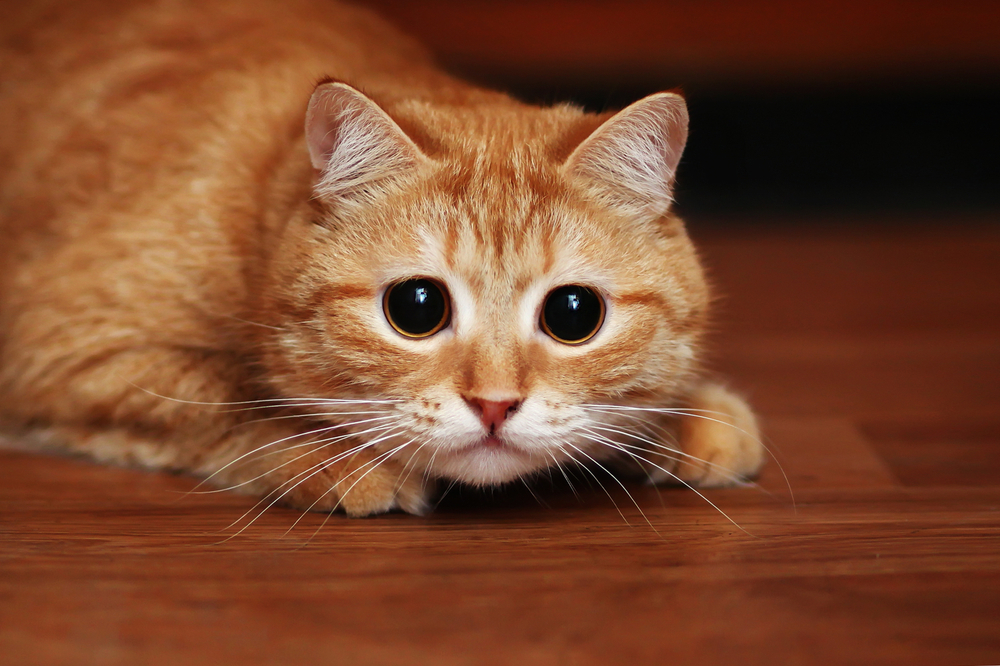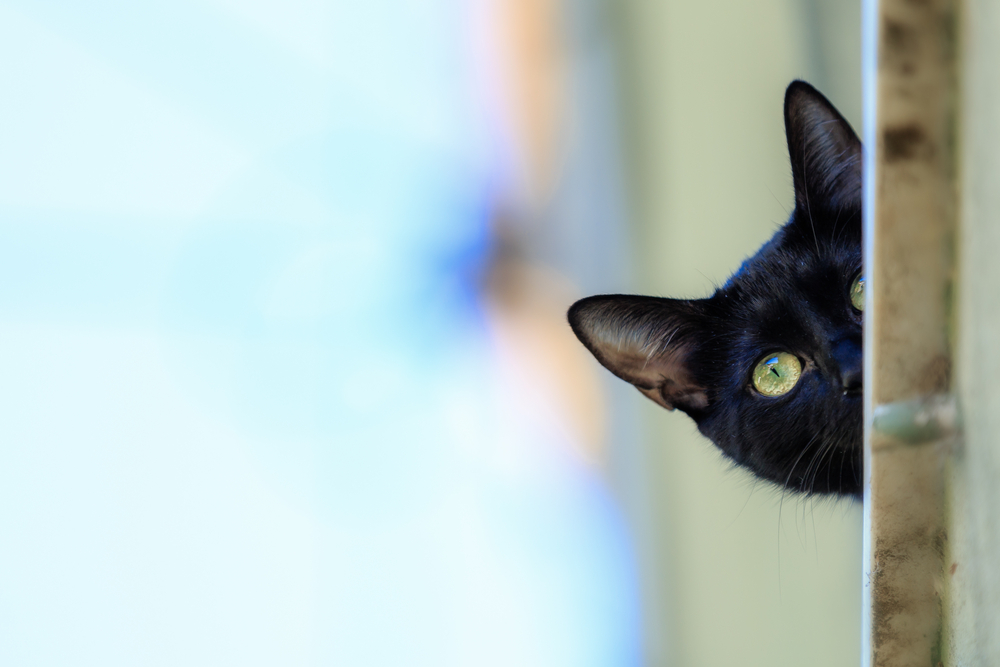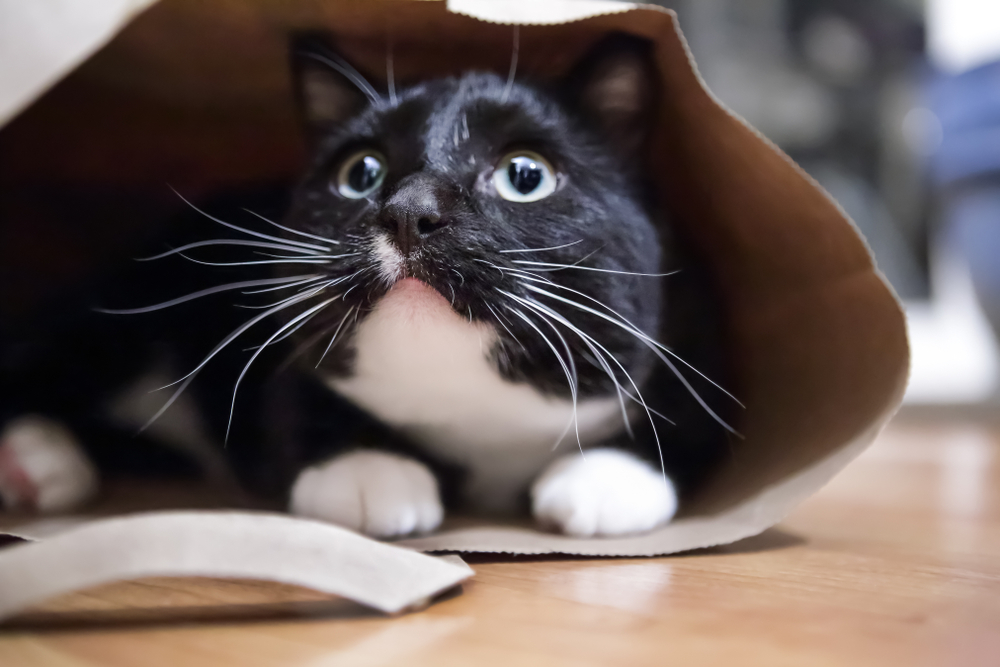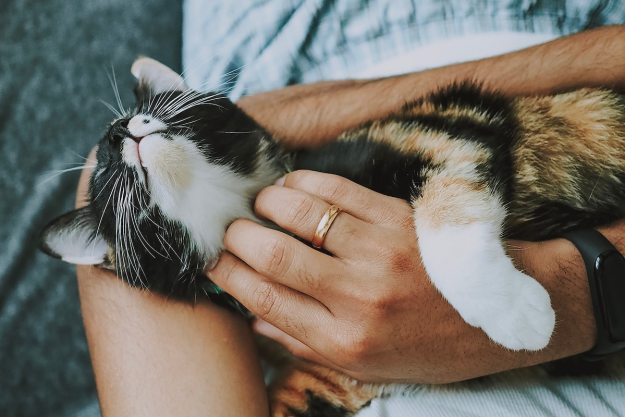Just as parents share their kid-related troubles with friends, pet parents like to commiserate when things don’t go as planned. If you’ve ever uttered the phrase “my cat is scared of everything,” then you’re probably desperate to know how to calm a scared cat. It’s normal for cats to be cautious around strangers and new pets, but when Miss Mittens hisses at visiting friends and bolts under the bed in response to every sound, your fur baby’s fear can turn an otherwise peaceful household into a disruptive space. Thankfully, we’ve compiled a list of four amazing ways you can calm a cat who’s scared of everything — no pricey training sessions required.

How to tell if your cat is frightened
While hissing, yowling, and scratching are obvious signs that your cat is upset, some cats exhibit more subtle clues. Here’s what you should look for:
- Urinating or defecating outside her litter box
- Rapidly swishing her tail or tucking it beneath her body
- Wide eyes with dilated pupils
- Crouching low to the floor
- Hiding in small spaces or beneath furniture
- Flattened or fast-moving ears
- Arching her back
- Puffing out her fur
- Running from room to room
If you notice any of these signs, your cat is clearly frightened. Fortunately, there are ways you can help her calm down.
1. Give her some space
Have you ever purchased an expensive cat tree only to have your feline friend curl up in the box instead? Cats love enclosed spaces because they feel cozy and secure. Cats are also intensely territorial creatures, so they can easily become overwhelmed if they have too much freedom to roam. This is especially true if you have small children or live in a multi-pet household. Try designating a smaller, cat-friendly space containing her food, water, toys, bed, and a litter box. You can keep the door closed to give her total privacy, or you can install a cat door, so she has the freedom to come and go as she pleases. Once your cat realizes she has a safe space of her own, she may feel more comfortable exploring the rest of the house. Allow her to take it at her own pace. It’s impossible to force a cat to be more social, and any attempts may backfire.
2. Encourage her to spend time with you
The last thing you want to do is chase a frightened cat. You may want her to come cuddle with you on the sofa, but you should refrain from reaching under the bed to pull her out of hiding. Chasing a cat who’s already terrified will only make matters worse. In fact, chasing any cat can lead to anxiety. Instead, leave her favorite treats out where she can smell them. With luck, the scent will draw her out of hiding. When she does come out of hiding, remain calm instead of rushing to greet her, as this may send her back into hiding. If she seems playful, encourage a game with her favorite toy. Make sure to give her lots of praise after every successful interaction to encourage socialization.
3. Don’t walk on eggshells
When you have a frightened cat, it may be tempting to listen to soft, calming music, watch TV only with the volume on low, or otherwise alter your behavior to accommodate her fears. In reality, you could be making the problem worse. Instead, it’s important to help your cat adjust to life in an active household. Like dogs, cats respond better to positive reinforcement. Muffling your lifestyle around a frightened cat may send the message that she should continue with her current behaviors. Instead, try using pheromone sprays or diffusers, which help create a tranquil, spa-like atmosphere for your feline friend.
4. Create positive connections
Does your cat hide under the bed every time your best friend comes over for coffee? If your cat is afraid of a friend, family member, or another pet, teach your cat to associate the source of her fear with something positive. Give your cat a treat if she wanders out into the living room while your friend is over. Praise her and reward her with her favorite toy when she stands near your dog. When your cat begins to associate visiting friends and family — or the family pooch — with positive experiences and treats, she may eventually stop being frightened altogether.

Living with a frightened cat can put a damper on your home life, but with time and patience, she should settle down. If nothing you’ve tried has helped, it may be time to speak to your vet. Cats can suffer from anxiety and depression, and sometimes medication is needed to help your frightened feline overcome her fears.
Editors' Recommendations
- When can kittens leave their mom? Don’t separate them too early
- Why do cats like to sleep on the bed with people? This common behavior explained
- Can cats have autism? Here’s what to know about unusual behavior in cats
- Everything you need to know about the munchkin cat: Some facts may surprise you
- These are the 10 most popular cat breeds, as counted by The Cat Fanciers’ Association





